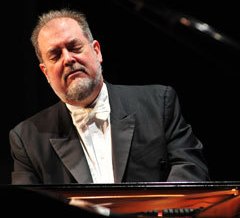 Pianist Garrick Ohlsson.
Pianist Garrick Ohlsson. Garrick Ohlsson has a remarkable memory – which is a very good thing for a concert pianist to have. Speaking from Dallas last week, the 66-year-old musician immediately recalled the first time he played Chopin’s Piano Concerto No. 1 with the Houston Symphony.
For his upcoming concerts with the orchestra he’ll again play Frédéric Chopin’s First Concerto. The program, led by guest conductor Robert Spano, includes Atlanta composer Jennifer Higdon’s Blue Cathedral and her Concerto for Orchestra.
Ohlsson and Chopin go back a long way together. In 1970, he became the first American to win first prize in Warsaw’s International Frédéric Chopin Piano Competition. Ever since then, Chopin’s music has been central to his career, and he speaks with eloquence about his lifelong relationship with Poland’s most famous composer.
Q: What are your memories of your win at the Chopin competition 45 years ago?
A: The experience was intense. In those days, Poland was a communist country and not very prosperous. But one of the good things the communists did was to emphasize the importance of art. And in Poland, Chopin is a secular saint: He embodies the patriotic aspirations of the nation.
So there was tremendous interest in the Chopin competition and also an incredible knowledge about Chopin’s music. These were very dedicated people, who knew the music inside out.
After I won, I was embraced as a hero. I felt like they adopted me. Even customs guards asked for my autograph – and they still do, when I go back. I should also say that the prize gave me the career I dreamed of. There I was, in the New York Times, the London Times and all the other major newspapers.
Q: Have you performed much in Poland since then?
A: I’ve been back, over the years. It’s a beloved place to play, but they have very high standards. They expect a great deal from me.
Q: How many times have you performed Chopin’s First Piano Concerto?
A: I’d “guesstimate” that I’ve played it 200 to 300 times – certainly no less than that. By now, it’s in my nervous system.
Q: Would you say that Chopin is your favorite composer?
A: That would be too limiting, but he’s one of my favorites. There’s also Beethoven, Mozart and a few others. I have very broad tastes.
Q: What’s so special about Chopin’s music?
A: Chopin is a composer I always love to return to, and my love and admiration of his music has grown over the years. He’s the greatest “pastry chef” of all the composers. But he’s not just a pastry chef; his music is very substantial. He’s an epic poet of great range and intensity.
Q: Yet his stature is sometimes questioned.
A: He didn’t write symphonies, or big operas and oratorios. He wrote almost exclusively for the piano. So he was sometimes considered a small-scale composer of salon music, dipping his quill into perfume when he wrote. But for all his music’s flowery grace, it’s made of iron, and it’s put together with perfection.
Q: Two countries claim Chopin: Poland and France. Was he more Polish or French?
A: His father was French, and his mother was Polish. He was born in Poland but left to make his fortune and went to Paris. Yet he was a fiercely patriotic Pole, and he felt deeply the sufferings of his homeland. And when he died, he wanted his heart carried to Warsaw. His sister took it back, in a coach.
A French critic once told me in no uncertain terms that in France, Chopin is considered a French composer. I think that his complicated harmonies and his coloristic touches made him the father of French impressionism. Debussy and Ravel wouldn’t be the same without Chopin.
And when I was in Poland for the first time, people asked me if I have Slavic blood. I don’t, although I did have Slavic teachers. Some people thought that if you’re not Polish, you can’t play Chopin.
But today, we’re way past that kind of nationalism, and I don’t worry about it at all. Chopin is one of the most beloved composers in the world. Every pianist has to learn Chopin, so he’s personally close to almost every pianist. Everyone says, “He’s mine.”
Q: You’ve recorded Chopin’s complete works. What was that like?
A: I took my time doing it, from 1990 to 2000. Recording is intense and challenging. You have a duty to get it right. A small flaw that you wouldn’t mind in a concert performance is quite annoying on a recording. And recording is embarrassing. It’s like taking your clothes off in front of a mirror and realizing you weren’t quite as good looking as you thought you were.
But it’s also deeply gratifying because you have a chance to hear yourself and to make the adjustments you want. Recording the complete works of Chopin was one of the greatest privileges I’ve been given.
Q: During the years, you have built up a broad repertoire. But do you ever feel that you’re too closely associated with just one composer?
A: No, because from the beginning of my career, I made a point of not being a specialist. My first manager suggested that I should play only Chopin for three years. But I made my debut with the New York Philharmonic playing Beethoven.
Q: What other composers are you playing these days?
A: I’ve been doing a lot of Alexander Scriabin because 2015 is his 100th anniversary. And there’s always Beethoven, Mozart, Bach, Brahms, Debussy – and all the other usual suspects. I’ve always been drawn to a wide range of music.
© Colin Eatock 2015
 RSS Feed
RSS Feed

